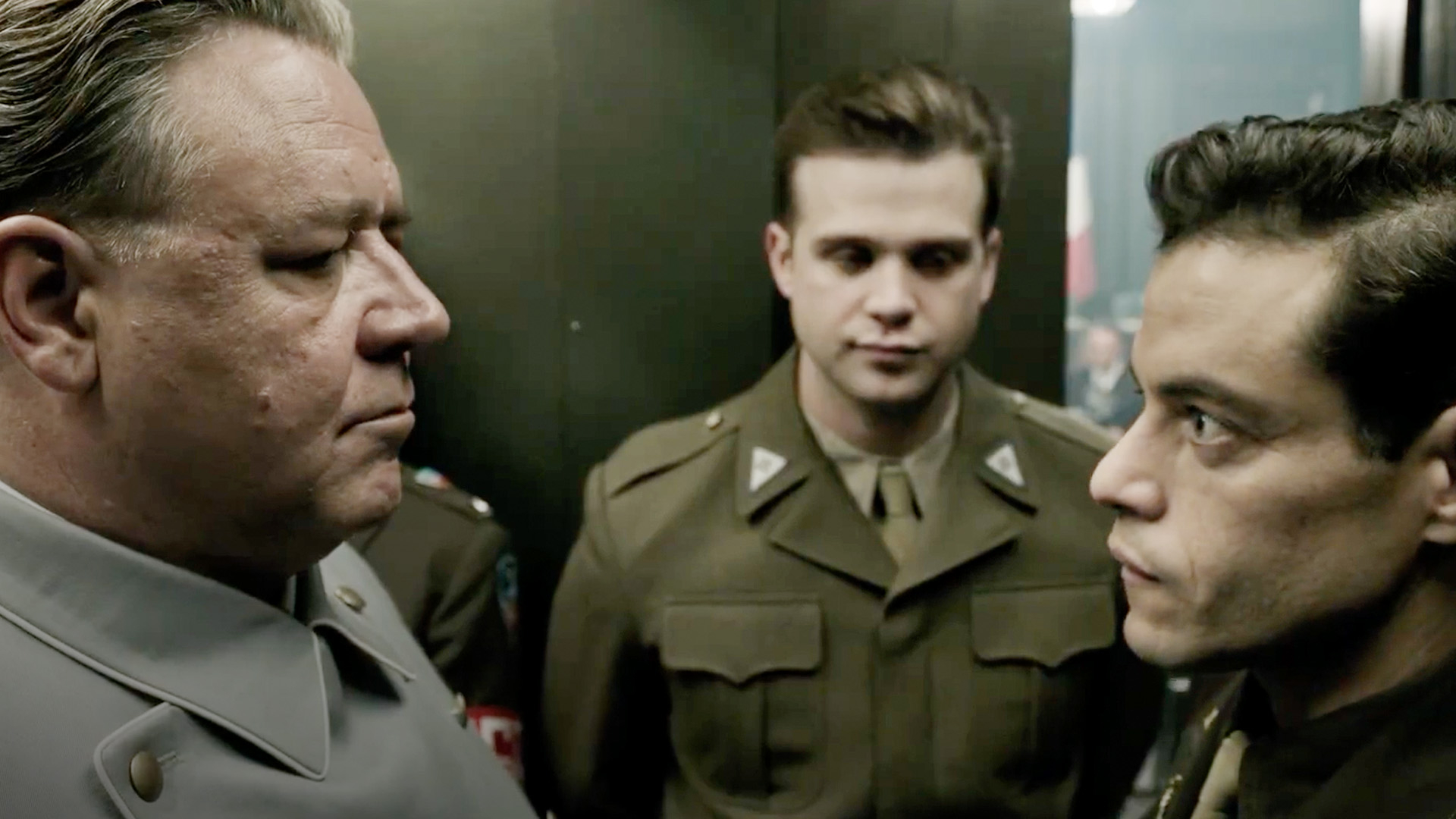Nuremberg
Nuremberg
VERDICT: Russell Crowe, Rami Malek and Michael Shannon give meaty performances in James Vanderbilt's solidly entertaining historical drama about the post-war trials of prominent Nazis, which is low on subtlety but full of contemporary political echoes.
Rooted in real events and real people, writer-director James Vanderbilt’s epic historical drama Nuremberg traces how the victorious allied powers of WWII laid the legal and medical groundwork for the International Military Tribunals of 1945-46, which put 22 surviving senior Nazis and their minions on trial for war crimes, mass murder, conspiracy and other related offences. These groundbreaking trials happened 80 years ago, but Vanderbilt makes sure they speak to today, largely by laying on the contemporary parallels with a giant shovel. Then again, any movie in which Russell Crowe gives the most understated performance was never going to be subtle.
Adapting Jack El-Hai’s 2013 non-fiction book The Nazi and the Psychiatrist, Vanderbilt is stepping behind the camera for the first time after more than 20 years as a screenwriter and producer. His high-profile credits including David Fincher’s Zodiac (2003), plus several chapters in the Spider-Man and Scream franchises. With Nuremberg, he is clearly aiming for grand Spielberg-ian spectacle, but he too often falls back on soapy melodrama and cornball cliché. Even so, as an old-school period blockbuster with a stellar cast and serious moral questions at its core, this deluxe B-movie is never less than solidly entertaining. Premiered to mostly positive reviews in Toronto earlier this month, it lands on European shores at San Sebastian film festival this week ahead of worldwide release by Sony Pictures Classics in November.
In a testosterone-heavy cast, Michael Shannon seethes with barely contained disgust at man’s inhumanity to man as chief US prosecutor Robert H. Jackson, a supreme court judge fighting hard for the moral imperative of allowing the Nuremberg defendants due legal process rather than simply executing them. Remi Malek is jittery and troubled as Douglas M. Kelley, amateur magician and chief psychiatrist in the US Army’s European Theater of Operations, who is charged with assessing the mental well-being of the prisoners. And rising British star Leo Woodhall (The White Lotus) plays Sergeant Howie Triest, the military interpreter whose unruffled demeanour masks a traumatic secret back story.
But Nuremberg is largely dominated by Crowe’s full-blooded, steam-belching performance as Hermann Göring, anointed successor to Adolf Hitler, president of the Reichstag, commander in chief of the Luftwaffe, ruthless narcissist and all-round Nazi supervillain. As the real Kelly would later report in his book on the trials, 22 Cells in Nuremberg, Göring was also charming and witty company, a devoted family man and a master tactician in the courtroom. To his credit, Vanderbilt makes this manipulative charisma central to the prisoner’s slow-burn psychological chess match with Kelley, lending extra dramatic heft to the film’s core two-hander scenes between the pair.
Opening with a Tarantino-style image of a US soldier urinating on a swastika symbol, Vanderbilt’s pulpy directing style is untroubled by anything resembling nuance. The characterisation is two-dimensional at best, the score thumpingly bombastic and the screenplay relentlessly, groaningly literal. Almost every sentence in the first hour is leaden plot exposition, potted biography and explanatory context. A scene in which Jackson summons Kelley to the Nuremberg parade grounds for a wordy history lesson on Nazism could almost be a thinly rewritten Wikipedia entry.
Then again, maybe now is the right time for easily digestible warnings about the evils of fascism wrapped in a high-gloss Hollywood package. Vanderbilt is certainly keen to stress unsettling parallels between the Third Reich and the current political landscape, particularly Trump’s America with its inner circle of Nazi-saluting billionaire cranks and white supremacist goons. While Crowe’s Göring does not exactly claim Hitler wanted to “make Germany great again”, he says something very similar, calmly laying out how fascism draws its power by deliberately exploiting mass grievance and hatred of outsiders, a speech that winks heavily at 21st century audiences.
The most powerful sequence in Nuremberg is composed of pure archive footage. During the trial, Jackson shames the court into silence by screening real newsreel showing the massed corpses of Jewish prisoners and other victims of Nazi genocide at Bergen-Belsen, Dachau and Buchenwald concentration camps. This chilling detour into documentary is a harrowing but necessary reminder of why films like this still need to be made, for all their preposterous pageantry and simplistic fabrications.
In 1947, the real Kelley told an Anti-Defamation League audience he believed all politicians should be psychologically examined before taking office. Nuremberg ends with Malek’s Kelley giving a radio interview to promote his book about the trials, in which he warns fascism could easily take root in the United States. This elicited loud cheers at the San Sebastian film festival press screening. But they were cheers of recognition, not joy.
Director, screenwriter: James Vanderbilt
Cast: Russell Crowe, Rami Malek, Michael Shannon, Leo Woodall, Richard E. Grant, John Slattery, Mark O’Brien, Colin Hanks, Lydia Peckham, Wrenn Schmidt, Lotte Verbeek
Cinematography: Dariusz Wolski
Editing: Tom Eagles
Music: Brian Tyler
Production designer: Eve Stewart
Costume designer: Bartholomew Cariss
Producers: Richard Saperstein, Bradley J. Fischer, James Vanderbilt, William Sherak, Frank Smith, Benjamin Tappan, Cherilyn Hawrysh, Istvan Major, George Freeman
Production companies: Bluestone Entertainment (US), Walden Media (US)
World sales: WME Independent
Venue: San Sebastian International Film Festival (Competition)
In English, German
149 minutes

